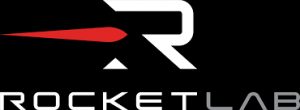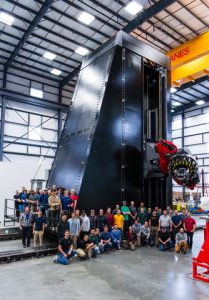 LONG BEACH, Calif. — August 8, 2024 — Rocket Lab USA Inc., a global supplier of launch services and space systems, today announced it has begun installation of the largest automated fiber placement (AFP) machine of its kind into the Company’s Neutron rocket production line in Middle River, Md. The AFP machine will enable Rocket Lab to automate production of the largest carbon composite rocket structures in history.
LONG BEACH, Calif. — August 8, 2024 — Rocket Lab USA Inc., a global supplier of launch services and space systems, today announced it has begun installation of the largest automated fiber placement (AFP) machine of its kind into the Company’s Neutron rocket production line in Middle River, Md. The AFP machine will enable Rocket Lab to automate production of the largest carbon composite rocket structures in history.

The custom-built 99 ton (90 metric tons), 39 ft tall (12-meter) robotic machine, American-made by Electroimpact in Washington, has just completed final acceptance testing with the manufacturer and installation has begun at Rocket Lab’s Space Structures Complex in Middle River, Md. The new machine will automate the production of all large composite structures of the Neutron launch vehicle including the panels that make up the 91 ft (28 meter) length interstage and fairing, 22.9 ft (7 meter) diameter first stage, and the 16.4 ft (5 meter) diameter second stage tank.
The autonomous machine can move up to 98 ft (30 meters) in length and lay down continuous carbon fiber composite at a rate of 328 ft (100 meters) per minute. The AFP machine also has a fully automated real-time inspection system that hunts for miniscule defects throughout the laminated carbon composite and alerts the machine operator of any issues before the machine begins laying down the next layer, providing additional assurance that these critical structures of the launch vehicle meet Rocket Lab’s high-quality standards required for reusable Neutron launches.
As Neutron’s carbon composite structures move into full-scale production, this autonomous machine is expected to introduce significant time-savings of 150,000+ manufacturing hours into the production process.
Rocket Lab founder and CEO, Sir Peter Beck, said: “As we build the world’s largest carbon composite rocket, it makes sense that we require a world-first carbon composite fiber placement machine. We’re combining our proprietary flight-proven carbon composite technology, additive manufacturing, and autonomous robotics to design and build large-scale aerospace components at a pace that will support not only Neutron’s launch cadence, but support Electron and carbon composites structures for our spacecraft customers too. We worked closely with our excellent partners at Electroimpact to create this robot and we’re thrilled with the results. It’s an innovative machine producing a next-generation rocket from one of the birthplaces of the aerospace industry in Baltimore, and we can’t wait to see its first carbon composite printed panels come off the production line soon.”
The AFP machine will also be leveraged to print smaller carbon composite Neutron structures, first stages of Rocket Lab’s Electron launch vehicle, and other flight-proven carbon composite structures for space including spacecraft structural panels and assemblies, solar panel substrates, carbon composite tanks and primary structures, and custom projects for the aerospace industry.
Posted: August 12, 2024
Source: Rocket Lab USA, Inc.




